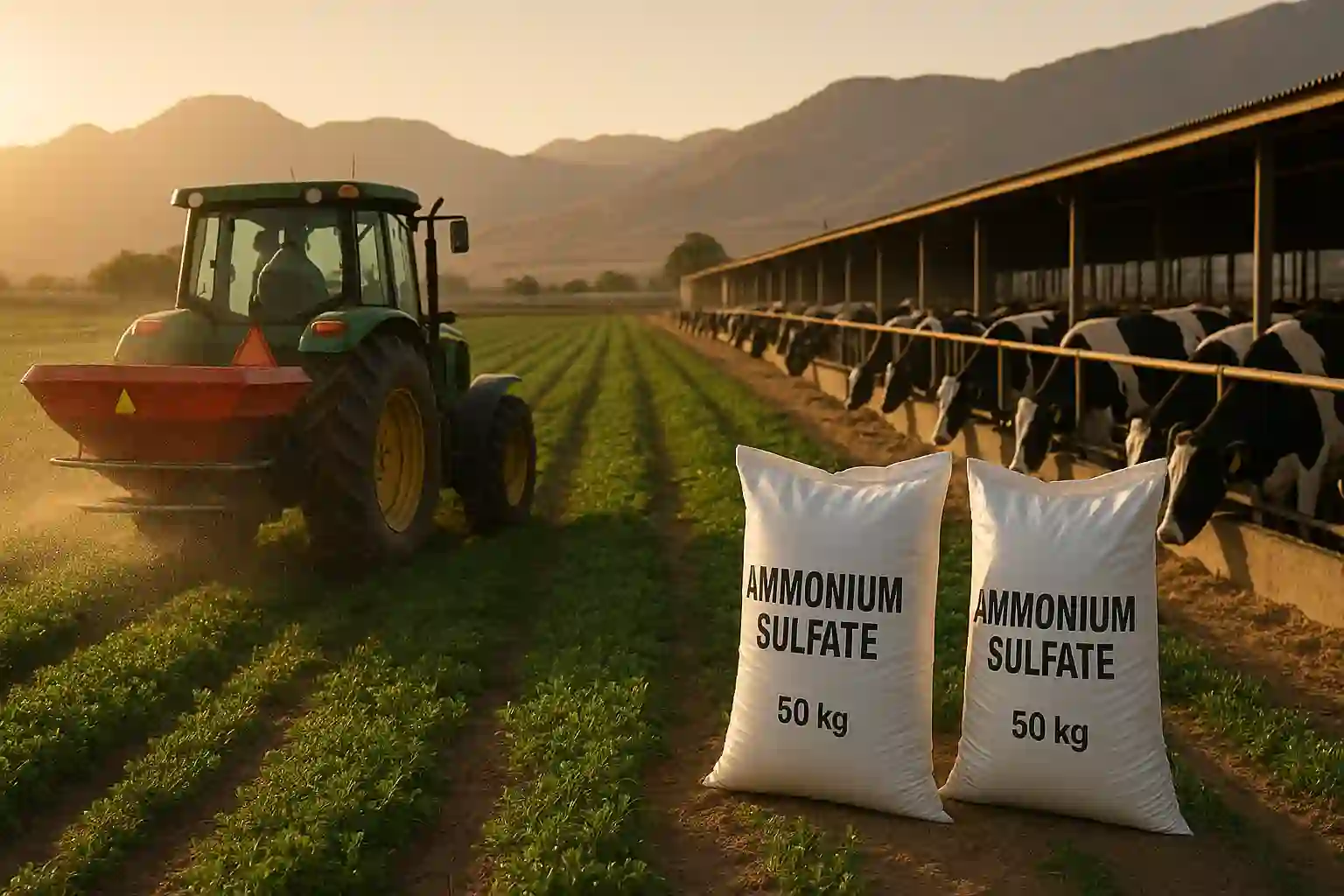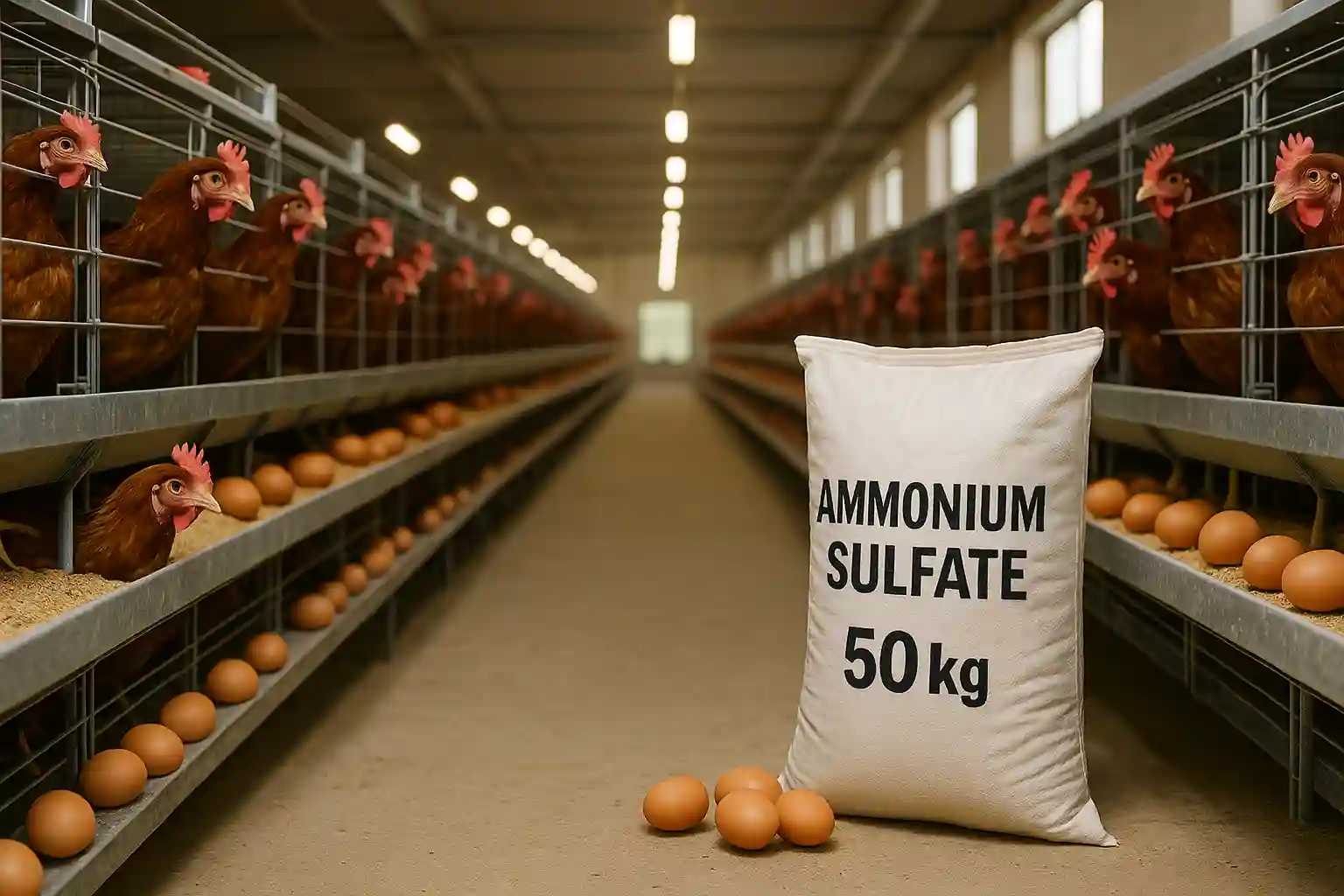Application of Ammonium Sulfate in the Livestock and Poultry Industry
Why Is Ammonium Sulfate Important for Livestock and Poultry?
In today’s world, the livestock and poultry industry is a critical pillar of food security. The growing global population and the rising demand for meat, eggs, dairy products, and other animal-derived products have made optimizing animal nutrition and feed management one of the main challenges for producers. In this context, selecting appropriate fertilizers and chemical additives for producing high-quality feed plays a key role.
One compound that has attracted significant attention in recent years is ammonium sulfate. This chemical, with the formula (NH₄)₂SO₄, is not only widely used in agriculture and the food industry as a fertilizer and additive but also holds a special place in the livestock and poultry sector. The reason for its importance is its ability to simultaneously provide nitrogen and sulfur—two essential elements that play a crucial role in animal metabolism and growth.
When it comes to livestock and poultry feed, it is important to remember that feed quality affects not only animal health but also the economic efficiency of farms. Proper use of fertilizers and additives like ammonium sulfate can reduce production costs, enhance the quality of final products (from meat to milk and eggs), and even reduce the environmental impact of livestock activities.
Role of Ammonium Sulfate in Livestock and Poultry Nutrition
Ammonium sulfate is primarily considered an indirect nutritional source in the livestock and poultry industry. It is often used for producing forage and animal feed and is transferred to the animals’ food chain through soil or plants.
Key points include:
Increasing the nutritional value of forage:
Using ammonium sulfate as a fertilizer in fields of alfalfa, clover, forage corn, and other fodder plants increases their nitrogen content. More nitrogen means higher protein in animal feed. Additionally, the sulfur in ammonium sulfate contributes to the formation of sulfur-containing amino acids such as methionine and cysteine, which are essential for animal growth.Improving meat and milk quality:
Animals fed on feed enriched with nitrogen and sulfur generally have better meat and milk yields. Sulfur aids in protein synthesis, which enhances the quality of meat (tenderness and juiciness) and milk (higher protein and fat content).Reducing feed costs:
Feed producers can use ammonium sulfate as a more economical source of nitrogen and sulfur to meet part of animals’ dietary needs. This is especially important when protein or mineral supplements are expensive.Enhancing poultry performance:
Poultry, especially broilers and laying hens, require a balanced diet with nitrogen and sulfur. Studies show that adequate sulfur in feed improves eggshell quality, chick growth, and reduces mortality rates.Environmental management:
One major problem in livestock and poultry farms is ammonia emissions from waste. Controlled use of ammonium sulfate in feed or forage can reduce ammonia release and prevent air pollution and unpleasant odors in livestock facilities.
Applications of Ammonium Sulfate in the Livestock and Poultry Industry
Ammonium sulfate is one of the most widely used chemical fertilizers in agriculture, especially in animal feed production. Its importance lies in providing both nitrogen (key for plant growth) and sulfur, which significantly improves agricultural product quality and indirectly or directly affects livestock and poultry performance. The main applications include:
1. Increasing Forage Growth
One of the main challenges in livestock and poultry farming is providing sufficient, high-quality forage. Forages such as alfalfa, clover, and forage corn require nitrogen and sulfur for growth. Ammonium sulfate supplies these elements, enabling plants to grow faster and have higher nutritional content.
Example: Using ammonium sulfate on forage corn increases leaf chlorophyll and stem growth, resulting in higher forage yield per hectare and reducing economic pressure on farmers.
2. Improving Protein Content of Animal Feed
Nitrogen in ammonium sulfate directly contributes to protein and amino acid synthesis in forage plants, increasing feed protein content. Sulfur helps produce methionine, vital for livestock and poultry growth.
As a result, animals consuming enriched forage receive more energy, and the quality of their meat and milk improves. Many industrial livestock farms consider ammonium sulfate an economic and nutritional strategy.
3. Improving Milk Quality
Milk quality is a key indicator of farm profitability and animal health. Ammonium sulfate enhances feed quality, increasing protein and fat content in milk.
Research shows that cows fed ammonium sulfate-enriched forage not only produce more milk but also higher percentages of lactose and protein, directly increasing the economic value of dairy products.
4. Strengthening Poultry Immune Systems
Poultry are highly susceptible to viral and bacterial diseases. Balanced nutrition is one of the most effective ways to reduce losses. Using ammonium sulfate in grains and feed increases methionine and other essential amino acids, strengthening immunity and resistance to diseases. Healthier birds achieve better performance and higher-quality meat.
5. Improving Eggshell Quality
Weak eggshells are a common problem in laying hens due to insufficient calcium and phosphorus absorption. Sulfur in ammonium sulfate improves soil chemical balance, enhancing plant nutrient uptake. Consequently, hens receive higher-quality feed, and eggshell quality improves, reducing breakage during transport and packaging.
6. Increasing Weight Gain
Feed enriched with ammonium sulfate contains more nutrients, promoting faster animal growth. For broilers, enriched feed significantly increases weight in a shorter period. For livestock, this translates to higher-quality meat production.
7. Reducing Feed Costs
Feed represents over 60% of operational costs in livestock and poultry farms. Any factor that reduces feed cost significantly increases profitability. Ammonium sulfate boosts domestic forage production and reduces dependency on imported feed.
8. Improving Meat Quality
Feed quality directly affects meat quality. Ammonium sulfate provides adequate nitrogen and sulfur, improving protein content and meat texture. Both red meat and poultry benefit from enriched feed in terms of nutritional value and taste.
9. Reducing Odor in Livestock Facilities
Sulfur in ammonium sulfate can reduce the unpleasant odor of animal waste, improving hygiene and reducing environmental and social nuisance.
10. Improving Fertility
Sulfur increases methionine in plants and consequently in feed, which is essential for animal fertility, helping increase reproductive performance.
11. Increasing Economic Efficiency
All the above factors ultimately enhance profitability. Ammonium sulfate enables the production of higher-quality, cost-effective feed, healthier animals, and better products, making it a strategic tool in the livestock and poultry industry.
Table Applications of Ammonium Sulfate in Livestock and Poultry
| Area of Use | Application Method | Practical Effects |
|---|---|---|
| Forage Production | Fertilizing alfalfa, clover, corn, sorghum | Increased crude protein, improved forage quality, enhanced animal growth |
| Poultry Nutrition | Indirect additive through plant feed | Improved eggshell quality, increased chick growth, reduced mortality |
| Meat Production | Included in livestock feed cycles | Improved meat quality, increased weight gain, better nutritional value |
| Milk Production | Used in dairy forage farms | Increased milk fat and protein, improved overall animal health |
| Manure Management | Reduces ammonia release | Reduced air pollution, improved animal welfare and hygiene |
| Livestock Fertility | Supply of sulfur-containing amino acids in feed | Improved reproductive health, increased fertility rates |
| Feed Cost Reduction | Replacement for expensive supplements | Lower production costs, higher profitability |
Disadvantages and Limitations of Ammonium Sulfate Use in Livestock and Poultry
Although ammonium sulfate is a valuable source of nitrogen and sulfur, excessive or improper use can create challenges. Awareness of these limitations helps producers design a balanced and scientific usage plan.
Soil Acidification:
Excessive use in forage production lowers soil pH, reducing absorption of other nutrients like phosphorus, calcium, and magnesium, negatively affecting animal nutrition.Reduced Efficiency in Acidic Soils:
While ammonium sulfate performs well in alkaline soils, it may worsen conditions in naturally acidic soils. In such cases, using it with agricultural lime is recommended.Transportation Costs:
Its high density makes transport more expensive than lighter fertilizers like urea.Lower Nitrogen Percentage than Urea:
Ammonium sulfate contains ~21% nitrogen, whereas urea provides ~46%. However, ammonium sulfate’s sulfur content remains a significant advantage.
Table: Advantages and Disadvantages
| Aspect | Advantages | Disadvantages |
|---|---|---|
| Feed Nutritional Value | Simultaneous supply of nitrogen and sulfur, increased protein | Lower nitrogen percentage than urea |
| Product Quality | Improved meat, milk, and eggs | Excessive use → soil acidification |
| Environment | Reduced nitrate and ammonia pollution | Overuse → soil salinity |
| Costs | Reduced need for protein/mineral supplements | Higher transport costs than some lighter fertilizers |
| Safety | High stability, easy storage | Safety precautions required during handling |
Comparison with Other Livestock Feed Sources
Urea:
Higher nitrogen, more economical for N supply, but lacks sulfur. Rapid ammonia release in alkaline soils may cause nitrogen loss.
Ammonium Nitrate:
Rapid uptake, useful in emergencies, but storage and explosion risks limit its use. Ammonium sulfate is safer.
Calcium Sulfate (Agricultural Gypsum):
Provides sulfur but no nitrogen. Ammonium sulfate supplies both elements.
Sulfur-containing Feed Supplements: Industrial supplements with methionine or cysteine are costly. Ammonium sulfate is a cheaper indirect sulfur source.
Environmental Effects of Ammonium Sulfate
Reduced Groundwater Pollution: Slow nitrogen release minimizes nitrate leaching.
Ammonia and Odor Control: Reduces ammonia emissions from poultry bedding and feed.
Compatibility with Sustainable Agriculture: Proper management ensures minimal environmental impact.
Safety Guidelines
Wear gloves and masks when handling the powder or solution.
Store in dry conditions to prevent caking or quality loss.
Mix carefully with strong alkaline substances.
Follow expert-recommended doses in indirect feed use to prevent metabolic issues.
Methods of Use
Field Fertilization: Applied before planting alfalfa, clover, and forage corn to boost protein from the beginning.
Top Dressing: Applied during vegetative growth to increase protein and feed quality.
Foliar Application: Used in special feed orchards as a rapid-acting nitrogen and sulfur source.
Price and Purchase: Choosing the Best Product
Factors affecting price:
Purity: Higher purity (e.g., 99%) is ideal for forage and feed.
Country of Origin: Iran, China, Turkey, India; domestic products often more affordable.
Packaging: 25 kg bags for small farms, 1000 kg bags for large operations.
Exchange Rate and Transportation: Import reliance affects final price.
Recommendations:
Obtain a Certificate of Analysis (COA).
Check product solubility and absence of insoluble impurities.
Buy from reputable brands.
Why Choose Ammonium Sulfate Brand?
High-purity, standard packaging, competitive pricing. Ensures high-quality feed matching global standards, supporting sustainable and profitable livestock and poultry farming.
FAQs
What role does ammonium sulfate play in livestock nutrition?
It increases plant protein content, enriching feed with nitrogen and sulfur.Is it safe for poultry?
Yes, indirect use is safe and improves eggshell quality and reduces mortality.Difference from urea?
Urea has higher nitrogen but no sulfur. Ammonium sulfate provides both N and S.Best usage method?
As a base or top dressing fertilizer; foliar or pit application in special cases.How to purchase authentic ammonium sulfate?
Buy from reputable suppliers and check the COA for nitrogen and sulfur content.
📌 References:
FAO – Fertilizer Use by Crop → FAO Official Site
ScienceDirect – Ammonium Sulfate Applications in Agriculture & Animal Feed → ScienceDirect Library
ResearchGate – Nutritional Impacts of Ammonium Sulfate in Poultry Diets → ResearchGate Articles



